Developing a Marketing Plan: Wotnot Baby Wipes in the Indian Market
VerifiedAdded on 2023/06/11
|15
|4288
|107
Report
AI Summary
This report presents a comprehensive marketing plan for Wotnot Baby Wipes' entry into the Indian market. It begins with an introduction to Wotnot, highlighting its biodegradable and organic baby wipes, and justifies India as a suitable expansion market due to its large population and increasing birth rate. The report identifies Johnson & Johnson as a primary competitor and analyzes the Indian cultural profile based on Hofstede's theory, considering power distance, individualism, masculinity, uncertainty avoidance, and indulgence. It discusses country-of-origin effects, consumer predispositions, and potential animosity towards foreign products. The report then details market segmentation, targeting middle and upper-class parents, and positioning Wotnot as a family-friendly, affordable brand. Finally, it touches upon market entry and expansion strategies, including recommendations for successful implementation in the Indian market. This document is available on Desklib, where students can find similar solved assignments and study resources.
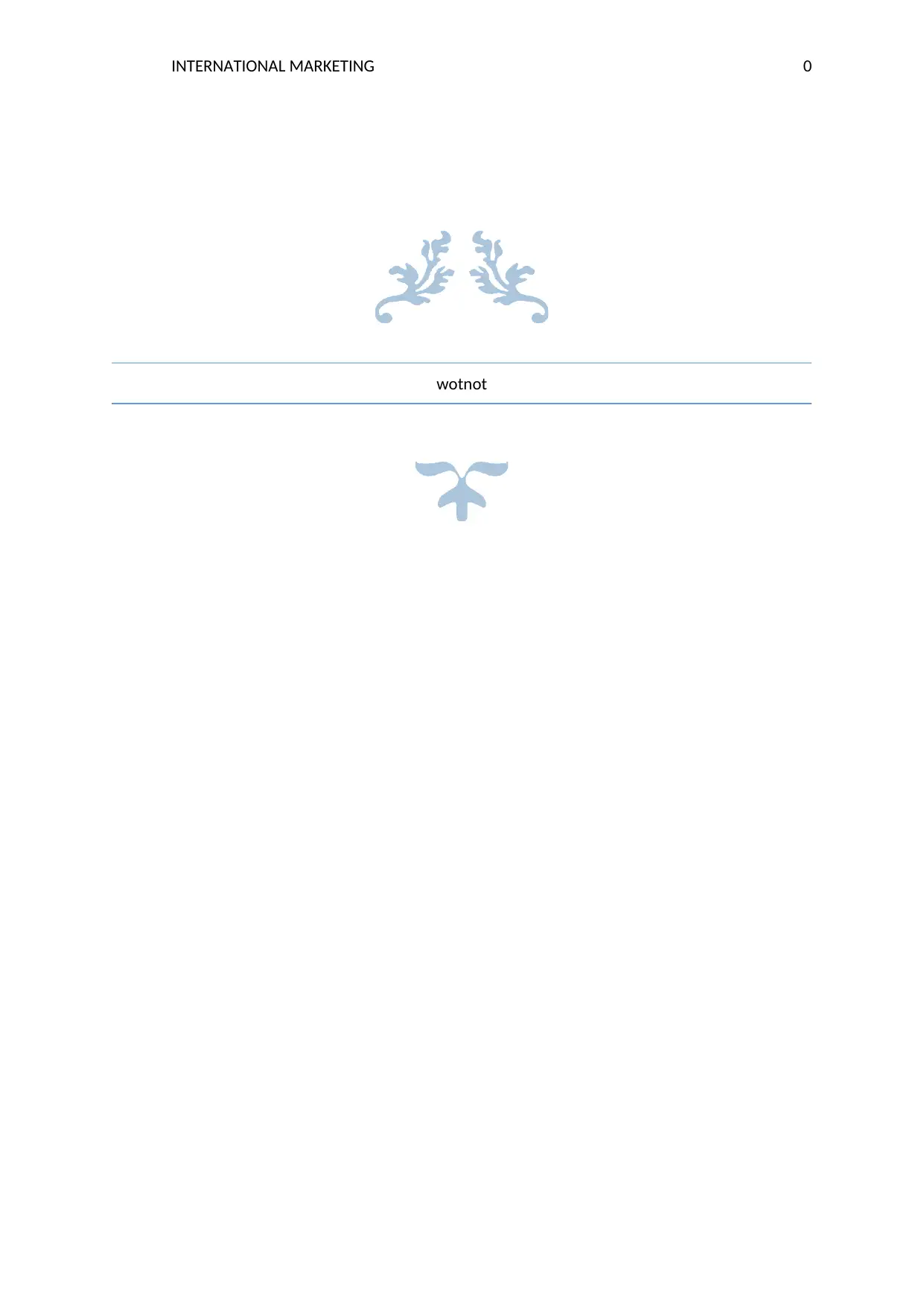
INTERNATIONAL MARKETING 0
wotnot
wotnot
Paraphrase This Document
Need a fresh take? Get an instant paraphrase of this document with our AI Paraphraser
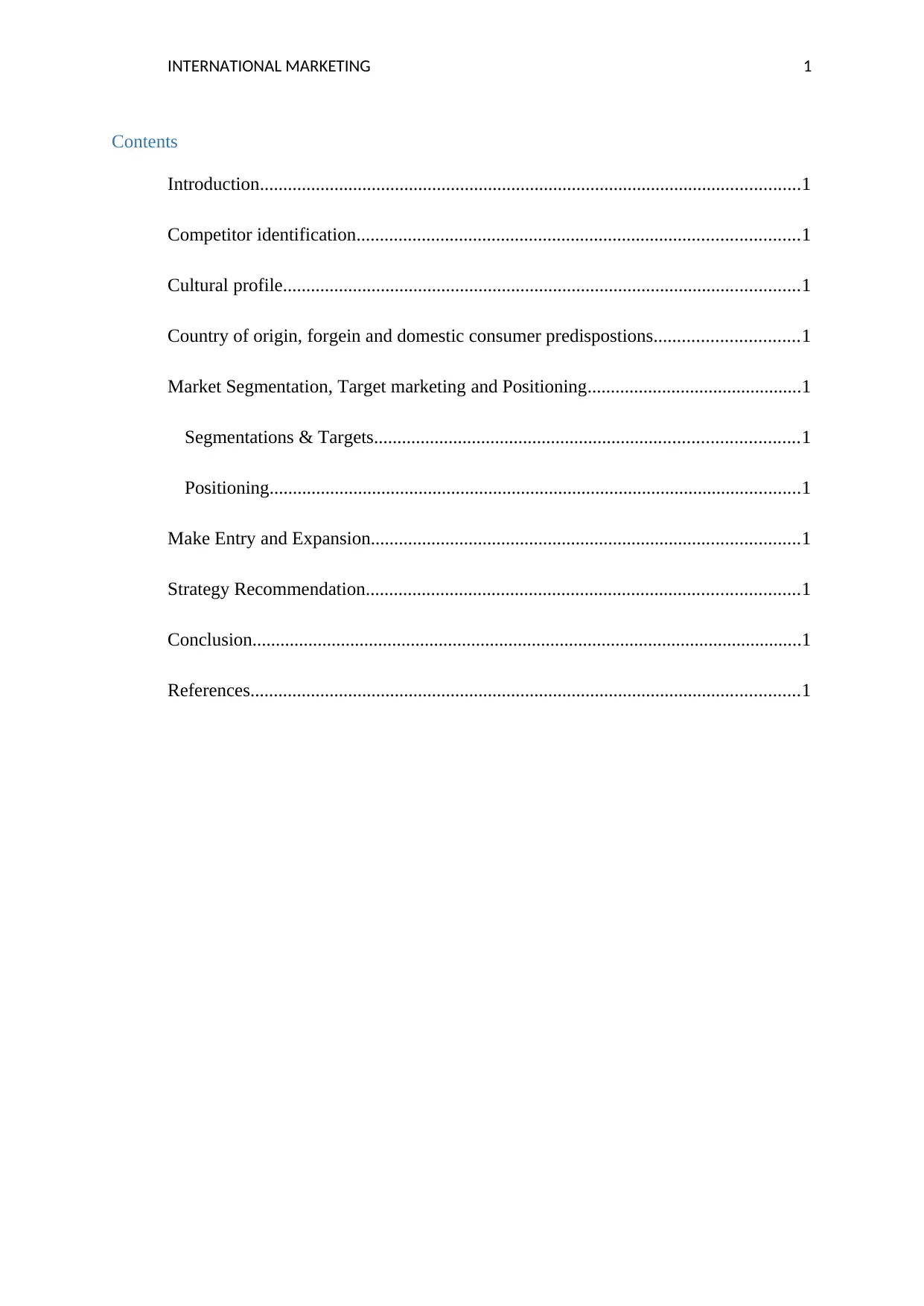
INTERNATIONAL MARKETING 1
Contents
Introduction....................................................................................................................1
Competitor identification...............................................................................................1
Cultural profile...............................................................................................................1
Country of origin, forgein and domestic consumer predispostions...............................1
Market Segmentation, Target marketing and Positioning..............................................1
Segmentations & Targets...........................................................................................1
Positioning..................................................................................................................1
Make Entry and Expansion............................................................................................1
Strategy Recommendation.............................................................................................1
Conclusion......................................................................................................................1
References......................................................................................................................1
Contents
Introduction....................................................................................................................1
Competitor identification...............................................................................................1
Cultural profile...............................................................................................................1
Country of origin, forgein and domestic consumer predispostions...............................1
Market Segmentation, Target marketing and Positioning..............................................1
Segmentations & Targets...........................................................................................1
Positioning..................................................................................................................1
Make Entry and Expansion............................................................................................1
Strategy Recommendation.............................................................................................1
Conclusion......................................................................................................................1
References......................................................................................................................1
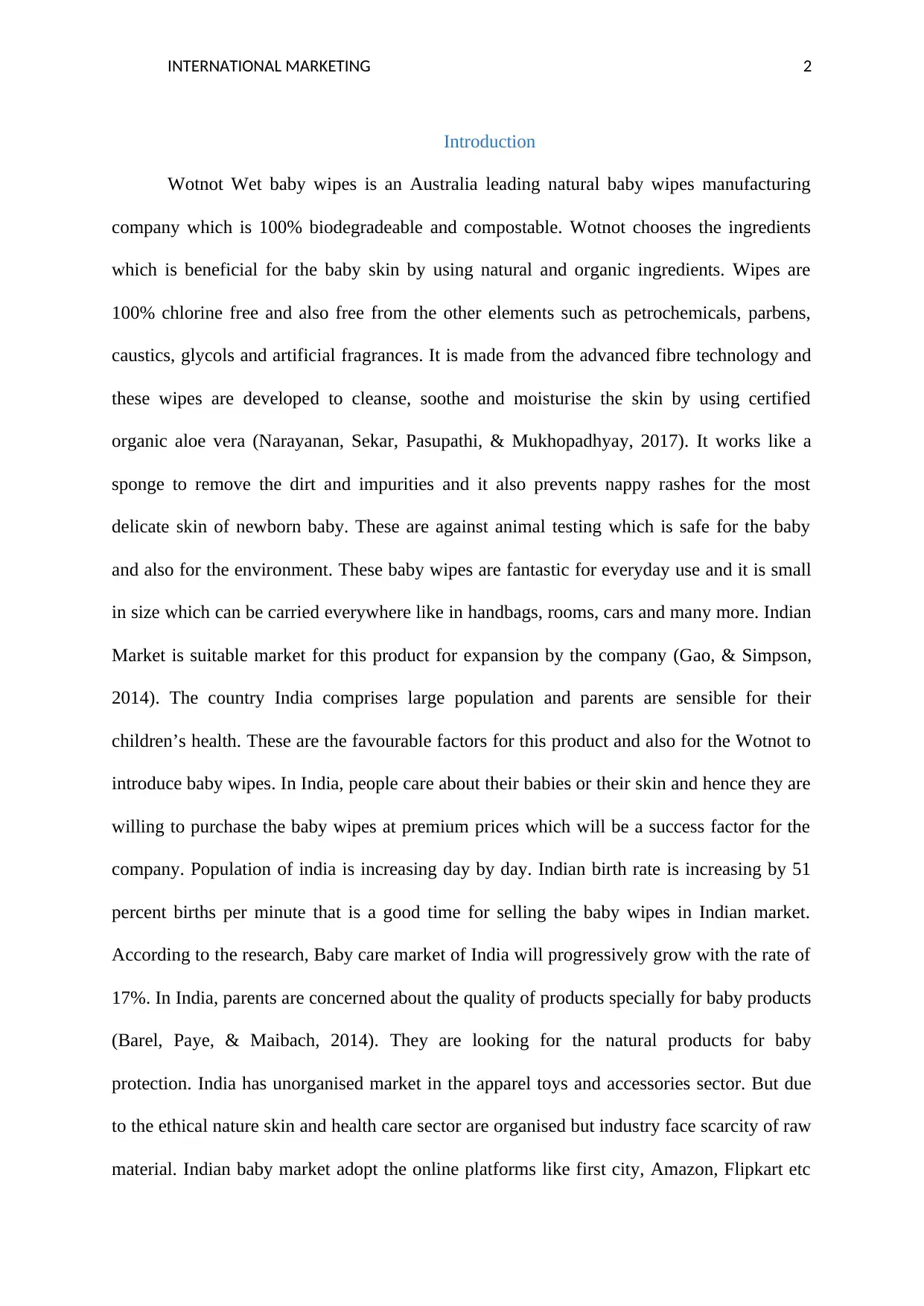
INTERNATIONAL MARKETING 2
Introduction
Wotnot Wet baby wipes is an Australia leading natural baby wipes manufacturing
company which is 100% biodegradeable and compostable. Wotnot chooses the ingredients
which is beneficial for the baby skin by using natural and organic ingredients. Wipes are
100% chlorine free and also free from the other elements such as petrochemicals, parbens,
caustics, glycols and artificial fragrances. It is made from the advanced fibre technology and
these wipes are developed to cleanse, soothe and moisturise the skin by using certified
organic aloe vera (Narayanan, Sekar, Pasupathi, & Mukhopadhyay, 2017). It works like a
sponge to remove the dirt and impurities and it also prevents nappy rashes for the most
delicate skin of newborn baby. These are against animal testing which is safe for the baby
and also for the environment. These baby wipes are fantastic for everyday use and it is small
in size which can be carried everywhere like in handbags, rooms, cars and many more. Indian
Market is suitable market for this product for expansion by the company (Gao, & Simpson,
2014). The country India comprises large population and parents are sensible for their
children’s health. These are the favourable factors for this product and also for the Wotnot to
introduce baby wipes. In India, people care about their babies or their skin and hence they are
willing to purchase the baby wipes at premium prices which will be a success factor for the
company. Population of india is increasing day by day. Indian birth rate is increasing by 51
percent births per minute that is a good time for selling the baby wipes in Indian market.
According to the research, Baby care market of India will progressively grow with the rate of
17%. In India, parents are concerned about the quality of products specially for baby products
(Barel, Paye, & Maibach, 2014). They are looking for the natural products for baby
protection. India has unorganised market in the apparel toys and accessories sector. But due
to the ethical nature skin and health care sector are organised but industry face scarcity of raw
material. Indian baby market adopt the online platforms like first city, Amazon, Flipkart etc
Introduction
Wotnot Wet baby wipes is an Australia leading natural baby wipes manufacturing
company which is 100% biodegradeable and compostable. Wotnot chooses the ingredients
which is beneficial for the baby skin by using natural and organic ingredients. Wipes are
100% chlorine free and also free from the other elements such as petrochemicals, parbens,
caustics, glycols and artificial fragrances. It is made from the advanced fibre technology and
these wipes are developed to cleanse, soothe and moisturise the skin by using certified
organic aloe vera (Narayanan, Sekar, Pasupathi, & Mukhopadhyay, 2017). It works like a
sponge to remove the dirt and impurities and it also prevents nappy rashes for the most
delicate skin of newborn baby. These are against animal testing which is safe for the baby
and also for the environment. These baby wipes are fantastic for everyday use and it is small
in size which can be carried everywhere like in handbags, rooms, cars and many more. Indian
Market is suitable market for this product for expansion by the company (Gao, & Simpson,
2014). The country India comprises large population and parents are sensible for their
children’s health. These are the favourable factors for this product and also for the Wotnot to
introduce baby wipes. In India, people care about their babies or their skin and hence they are
willing to purchase the baby wipes at premium prices which will be a success factor for the
company. Population of india is increasing day by day. Indian birth rate is increasing by 51
percent births per minute that is a good time for selling the baby wipes in Indian market.
According to the research, Baby care market of India will progressively grow with the rate of
17%. In India, parents are concerned about the quality of products specially for baby products
(Barel, Paye, & Maibach, 2014). They are looking for the natural products for baby
protection. India has unorganised market in the apparel toys and accessories sector. But due
to the ethical nature skin and health care sector are organised but industry face scarcity of raw
material. Indian baby market adopt the online platforms like first city, Amazon, Flipkart etc
⊘ This is a preview!⊘
Do you want full access?
Subscribe today to unlock all pages.

Trusted by 1+ million students worldwide
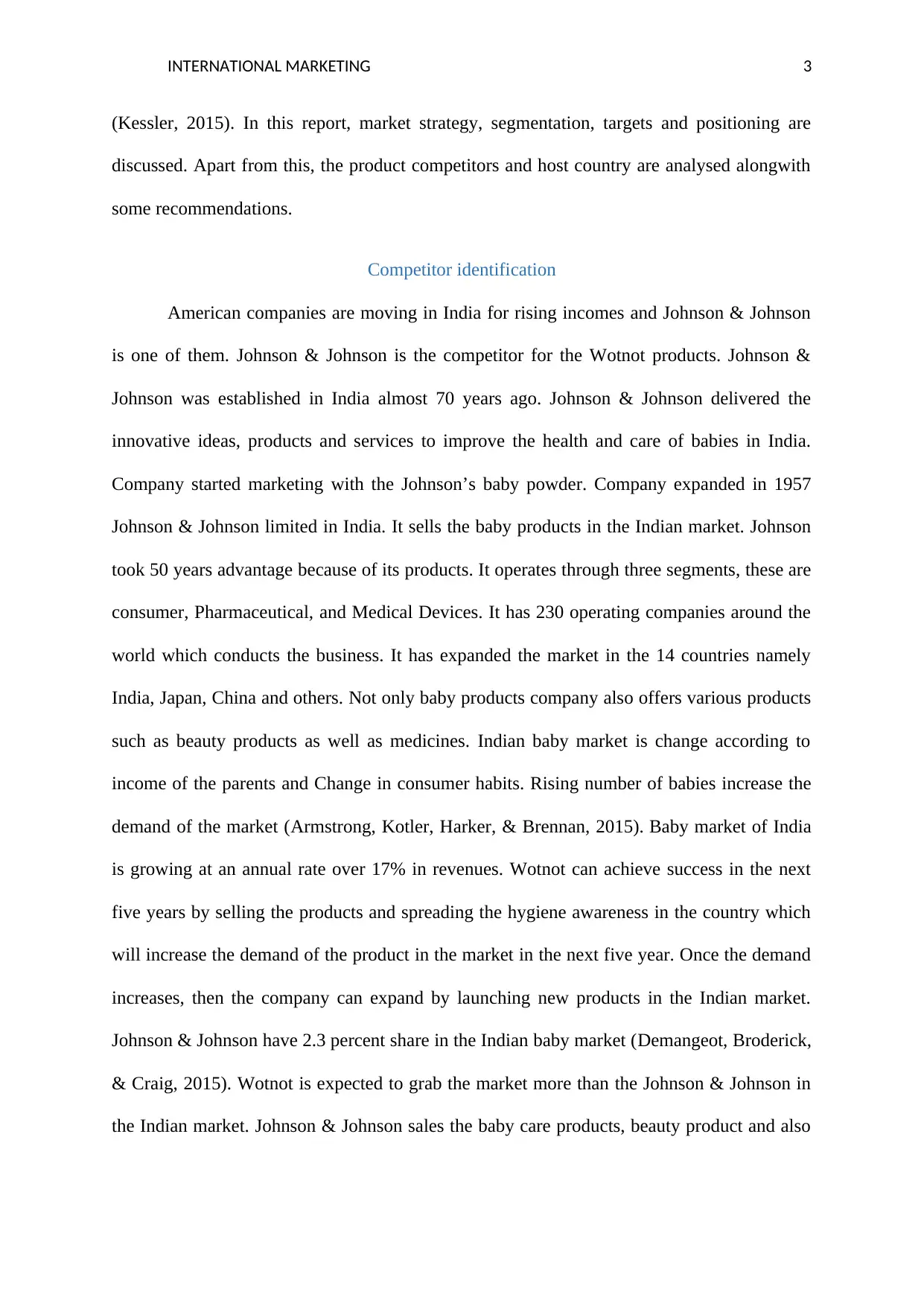
INTERNATIONAL MARKETING 3
(Kessler, 2015). In this report, market strategy, segmentation, targets and positioning are
discussed. Apart from this, the product competitors and host country are analysed alongwith
some recommendations.
Competitor identification
American companies are moving in India for rising incomes and Johnson & Johnson
is one of them. Johnson & Johnson is the competitor for the Wotnot products. Johnson &
Johnson was established in India almost 70 years ago. Johnson & Johnson delivered the
innovative ideas, products and services to improve the health and care of babies in India.
Company started marketing with the Johnson’s baby powder. Company expanded in 1957
Johnson & Johnson limited in India. It sells the baby products in the Indian market. Johnson
took 50 years advantage because of its products. It operates through three segments, these are
consumer, Pharmaceutical, and Medical Devices. It has 230 operating companies around the
world which conducts the business. It has expanded the market in the 14 countries namely
India, Japan, China and others. Not only baby products company also offers various products
such as beauty products as well as medicines. Indian baby market is change according to
income of the parents and Change in consumer habits. Rising number of babies increase the
demand of the market (Armstrong, Kotler, Harker, & Brennan, 2015). Baby market of India
is growing at an annual rate over 17% in revenues. Wotnot can achieve success in the next
five years by selling the products and spreading the hygiene awareness in the country which
will increase the demand of the product in the market in the next five year. Once the demand
increases, then the company can expand by launching new products in the Indian market.
Johnson & Johnson have 2.3 percent share in the Indian baby market (Demangeot, Broderick,
& Craig, 2015). Wotnot is expected to grab the market more than the Johnson & Johnson in
the Indian market. Johnson & Johnson sales the baby care products, beauty product and also
(Kessler, 2015). In this report, market strategy, segmentation, targets and positioning are
discussed. Apart from this, the product competitors and host country are analysed alongwith
some recommendations.
Competitor identification
American companies are moving in India for rising incomes and Johnson & Johnson
is one of them. Johnson & Johnson is the competitor for the Wotnot products. Johnson &
Johnson was established in India almost 70 years ago. Johnson & Johnson delivered the
innovative ideas, products and services to improve the health and care of babies in India.
Company started marketing with the Johnson’s baby powder. Company expanded in 1957
Johnson & Johnson limited in India. It sells the baby products in the Indian market. Johnson
took 50 years advantage because of its products. It operates through three segments, these are
consumer, Pharmaceutical, and Medical Devices. It has 230 operating companies around the
world which conducts the business. It has expanded the market in the 14 countries namely
India, Japan, China and others. Not only baby products company also offers various products
such as beauty products as well as medicines. Indian baby market is change according to
income of the parents and Change in consumer habits. Rising number of babies increase the
demand of the market (Armstrong, Kotler, Harker, & Brennan, 2015). Baby market of India
is growing at an annual rate over 17% in revenues. Wotnot can achieve success in the next
five years by selling the products and spreading the hygiene awareness in the country which
will increase the demand of the product in the market in the next five year. Once the demand
increases, then the company can expand by launching new products in the Indian market.
Johnson & Johnson have 2.3 percent share in the Indian baby market (Demangeot, Broderick,
& Craig, 2015). Wotnot is expected to grab the market more than the Johnson & Johnson in
the Indian market. Johnson & Johnson sales the baby care products, beauty product and also
Paraphrase This Document
Need a fresh take? Get an instant paraphrase of this document with our AI Paraphraser
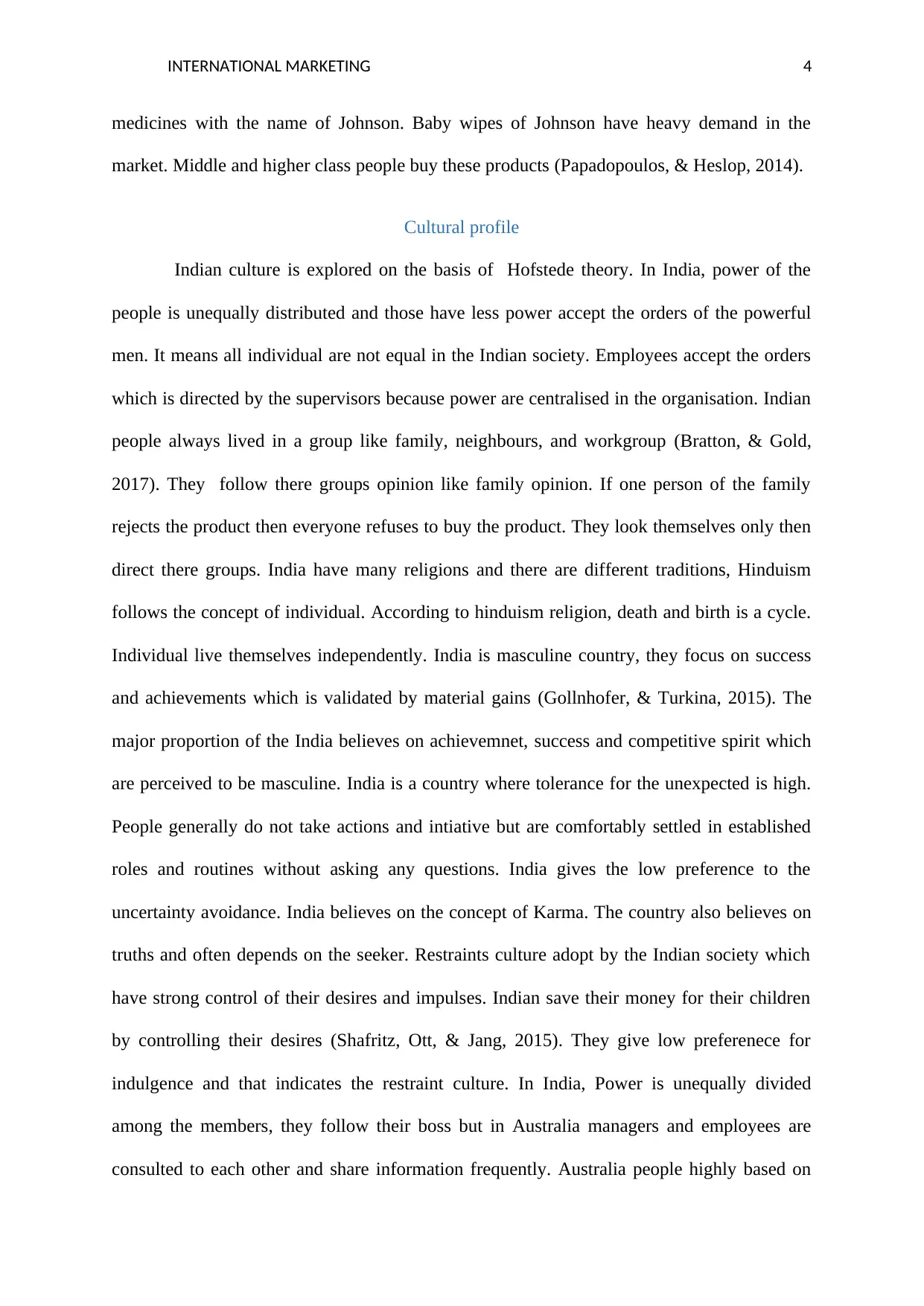
INTERNATIONAL MARKETING 4
medicines with the name of Johnson. Baby wipes of Johnson have heavy demand in the
market. Middle and higher class people buy these products (Papadopoulos, & Heslop, 2014).
Cultural profile
Indian culture is explored on the basis of Hofstede theory. In India, power of the
people is unequally distributed and those have less power accept the orders of the powerful
men. It means all individual are not equal in the Indian society. Employees accept the orders
which is directed by the supervisors because power are centralised in the organisation. Indian
people always lived in a group like family, neighbours, and workgroup (Bratton, & Gold,
2017). They follow there groups opinion like family opinion. If one person of the family
rejects the product then everyone refuses to buy the product. They look themselves only then
direct there groups. India have many religions and there are different traditions, Hinduism
follows the concept of individual. According to hinduism religion, death and birth is a cycle.
Individual live themselves independently. India is masculine country, they focus on success
and achievements which is validated by material gains (Gollnhofer, & Turkina, 2015). The
major proportion of the India believes on achievemnet, success and competitive spirit which
are perceived to be masculine. India is a country where tolerance for the unexpected is high.
People generally do not take actions and intiative but are comfortably settled in established
roles and routines without asking any questions. India gives the low preference to the
uncertainty avoidance. India believes on the concept of Karma. The country also believes on
truths and often depends on the seeker. Restraints culture adopt by the Indian society which
have strong control of their desires and impulses. Indian save their money for their children
by controlling their desires (Shafritz, Ott, & Jang, 2015). They give low preferenece for
indulgence and that indicates the restraint culture. In India, Power is unequally divided
among the members, they follow their boss but in Australia managers and employees are
consulted to each other and share information frequently. Australia people highly based on
medicines with the name of Johnson. Baby wipes of Johnson have heavy demand in the
market. Middle and higher class people buy these products (Papadopoulos, & Heslop, 2014).
Cultural profile
Indian culture is explored on the basis of Hofstede theory. In India, power of the
people is unequally distributed and those have less power accept the orders of the powerful
men. It means all individual are not equal in the Indian society. Employees accept the orders
which is directed by the supervisors because power are centralised in the organisation. Indian
people always lived in a group like family, neighbours, and workgroup (Bratton, & Gold,
2017). They follow there groups opinion like family opinion. If one person of the family
rejects the product then everyone refuses to buy the product. They look themselves only then
direct there groups. India have many religions and there are different traditions, Hinduism
follows the concept of individual. According to hinduism religion, death and birth is a cycle.
Individual live themselves independently. India is masculine country, they focus on success
and achievements which is validated by material gains (Gollnhofer, & Turkina, 2015). The
major proportion of the India believes on achievemnet, success and competitive spirit which
are perceived to be masculine. India is a country where tolerance for the unexpected is high.
People generally do not take actions and intiative but are comfortably settled in established
roles and routines without asking any questions. India gives the low preference to the
uncertainty avoidance. India believes on the concept of Karma. The country also believes on
truths and often depends on the seeker. Restraints culture adopt by the Indian society which
have strong control of their desires and impulses. Indian save their money for their children
by controlling their desires (Shafritz, Ott, & Jang, 2015). They give low preferenece for
indulgence and that indicates the restraint culture. In India, Power is unequally divided
among the members, they follow their boss but in Australia managers and employees are
consulted to each other and share information frequently. Australia people highly based on
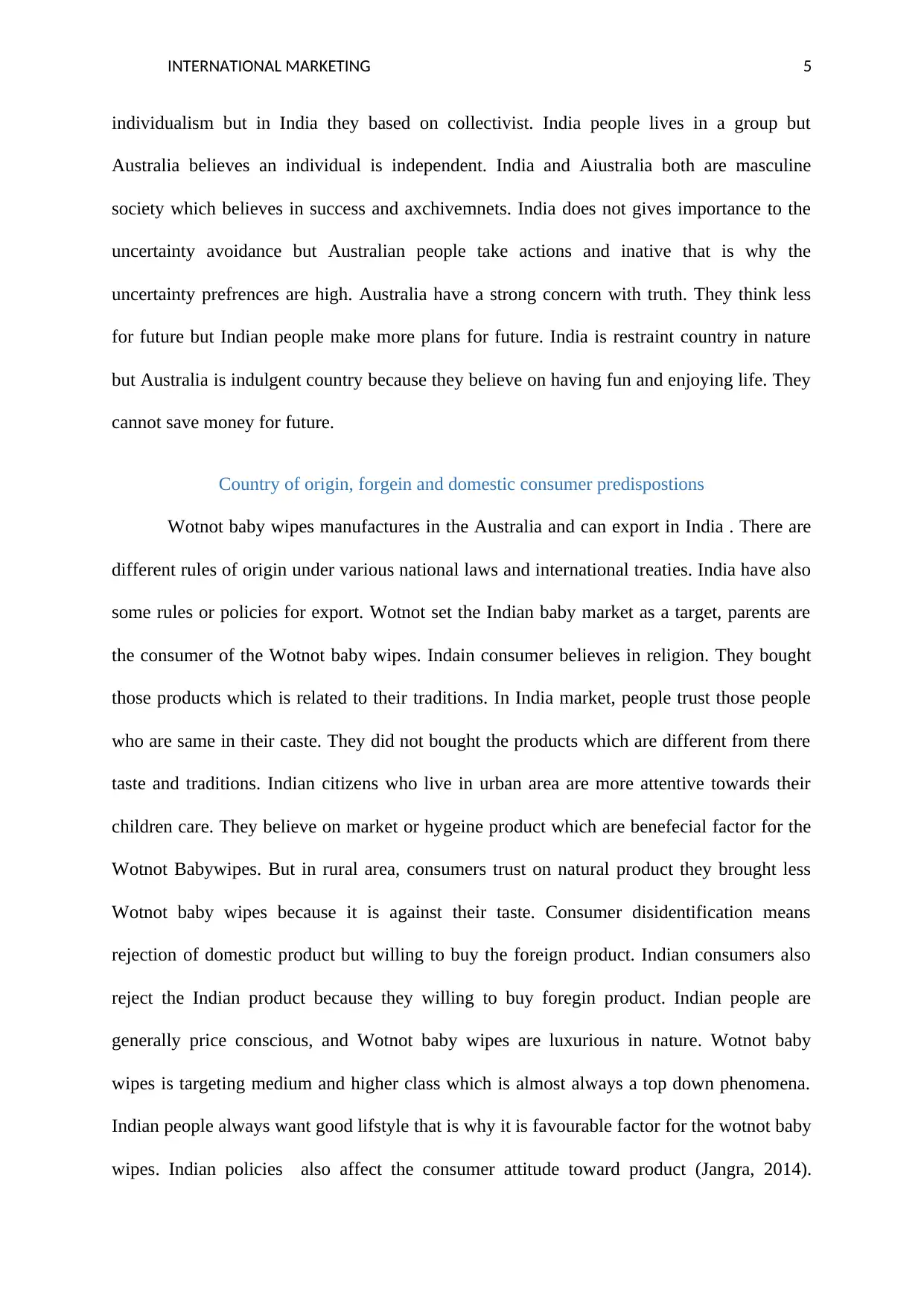
INTERNATIONAL MARKETING 5
individualism but in India they based on collectivist. India people lives in a group but
Australia believes an individual is independent. India and Aiustralia both are masculine
society which believes in success and axchivemnets. India does not gives importance to the
uncertainty avoidance but Australian people take actions and inative that is why the
uncertainty prefrences are high. Australia have a strong concern with truth. They think less
for future but Indian people make more plans for future. India is restraint country in nature
but Australia is indulgent country because they believe on having fun and enjoying life. They
cannot save money for future.
Country of origin, forgein and domestic consumer predispostions
Wotnot baby wipes manufactures in the Australia and can export in India . There are
different rules of origin under various national laws and international treaties. India have also
some rules or policies for export. Wotnot set the Indian baby market as a target, parents are
the consumer of the Wotnot baby wipes. Indain consumer believes in religion. They bought
those products which is related to their traditions. In India market, people trust those people
who are same in their caste. They did not bought the products which are different from there
taste and traditions. Indian citizens who live in urban area are more attentive towards their
children care. They believe on market or hygeine product which are benefecial factor for the
Wotnot Babywipes. But in rural area, consumers trust on natural product they brought less
Wotnot baby wipes because it is against their taste. Consumer disidentification means
rejection of domestic product but willing to buy the foreign product. Indian consumers also
reject the Indian product because they willing to buy foregin product. Indian people are
generally price conscious, and Wotnot baby wipes are luxurious in nature. Wotnot baby
wipes is targeting medium and higher class which is almost always a top down phenomena.
Indian people always want good lifstyle that is why it is favourable factor for the wotnot baby
wipes. Indian policies also affect the consumer attitude toward product (Jangra, 2014).
individualism but in India they based on collectivist. India people lives in a group but
Australia believes an individual is independent. India and Aiustralia both are masculine
society which believes in success and axchivemnets. India does not gives importance to the
uncertainty avoidance but Australian people take actions and inative that is why the
uncertainty prefrences are high. Australia have a strong concern with truth. They think less
for future but Indian people make more plans for future. India is restraint country in nature
but Australia is indulgent country because they believe on having fun and enjoying life. They
cannot save money for future.
Country of origin, forgein and domestic consumer predispostions
Wotnot baby wipes manufactures in the Australia and can export in India . There are
different rules of origin under various national laws and international treaties. India have also
some rules or policies for export. Wotnot set the Indian baby market as a target, parents are
the consumer of the Wotnot baby wipes. Indain consumer believes in religion. They bought
those products which is related to their traditions. In India market, people trust those people
who are same in their caste. They did not bought the products which are different from there
taste and traditions. Indian citizens who live in urban area are more attentive towards their
children care. They believe on market or hygeine product which are benefecial factor for the
Wotnot Babywipes. But in rural area, consumers trust on natural product they brought less
Wotnot baby wipes because it is against their taste. Consumer disidentification means
rejection of domestic product but willing to buy the foreign product. Indian consumers also
reject the Indian product because they willing to buy foregin product. Indian people are
generally price conscious, and Wotnot baby wipes are luxurious in nature. Wotnot baby
wipes is targeting medium and higher class which is almost always a top down phenomena.
Indian people always want good lifstyle that is why it is favourable factor for the wotnot baby
wipes. Indian policies also affect the consumer attitude toward product (Jangra, 2014).
⊘ This is a preview!⊘
Do you want full access?
Subscribe today to unlock all pages.

Trusted by 1+ million students worldwide
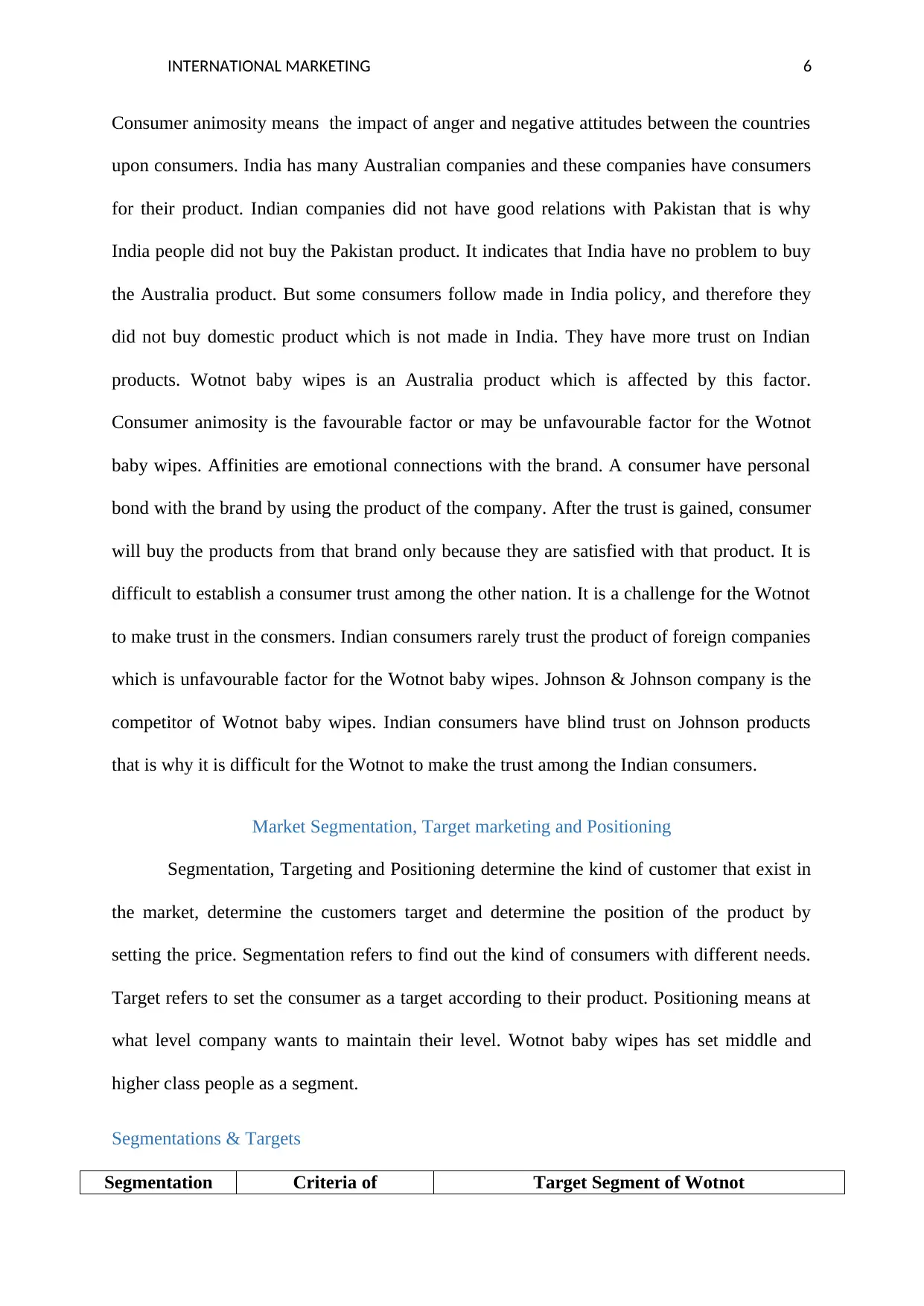
INTERNATIONAL MARKETING 6
Consumer animosity means the impact of anger and negative attitudes between the countries
upon consumers. India has many Australian companies and these companies have consumers
for their product. Indian companies did not have good relations with Pakistan that is why
India people did not buy the Pakistan product. It indicates that India have no problem to buy
the Australia product. But some consumers follow made in India policy, and therefore they
did not buy domestic product which is not made in India. They have more trust on Indian
products. Wotnot baby wipes is an Australia product which is affected by this factor.
Consumer animosity is the favourable factor or may be unfavourable factor for the Wotnot
baby wipes. Affinities are emotional connections with the brand. A consumer have personal
bond with the brand by using the product of the company. After the trust is gained, consumer
will buy the products from that brand only because they are satisfied with that product. It is
difficult to establish a consumer trust among the other nation. It is a challenge for the Wotnot
to make trust in the consmers. Indian consumers rarely trust the product of foreign companies
which is unfavourable factor for the Wotnot baby wipes. Johnson & Johnson company is the
competitor of Wotnot baby wipes. Indian consumers have blind trust on Johnson products
that is why it is difficult for the Wotnot to make the trust among the Indian consumers.
Market Segmentation, Target marketing and Positioning
Segmentation, Targeting and Positioning determine the kind of customer that exist in
the market, determine the customers target and determine the position of the product by
setting the price. Segmentation refers to find out the kind of consumers with different needs.
Target refers to set the consumer as a target according to their product. Positioning means at
what level company wants to maintain their level. Wotnot baby wipes has set middle and
higher class people as a segment.
Segmentations & Targets
Segmentation Criteria of Target Segment of Wotnot
Consumer animosity means the impact of anger and negative attitudes between the countries
upon consumers. India has many Australian companies and these companies have consumers
for their product. Indian companies did not have good relations with Pakistan that is why
India people did not buy the Pakistan product. It indicates that India have no problem to buy
the Australia product. But some consumers follow made in India policy, and therefore they
did not buy domestic product which is not made in India. They have more trust on Indian
products. Wotnot baby wipes is an Australia product which is affected by this factor.
Consumer animosity is the favourable factor or may be unfavourable factor for the Wotnot
baby wipes. Affinities are emotional connections with the brand. A consumer have personal
bond with the brand by using the product of the company. After the trust is gained, consumer
will buy the products from that brand only because they are satisfied with that product. It is
difficult to establish a consumer trust among the other nation. It is a challenge for the Wotnot
to make trust in the consmers. Indian consumers rarely trust the product of foreign companies
which is unfavourable factor for the Wotnot baby wipes. Johnson & Johnson company is the
competitor of Wotnot baby wipes. Indian consumers have blind trust on Johnson products
that is why it is difficult for the Wotnot to make the trust among the Indian consumers.
Market Segmentation, Target marketing and Positioning
Segmentation, Targeting and Positioning determine the kind of customer that exist in
the market, determine the customers target and determine the position of the product by
setting the price. Segmentation refers to find out the kind of consumers with different needs.
Target refers to set the consumer as a target according to their product. Positioning means at
what level company wants to maintain their level. Wotnot baby wipes has set middle and
higher class people as a segment.
Segmentations & Targets
Segmentation Criteria of Target Segment of Wotnot
Paraphrase This Document
Need a fresh take? Get an instant paraphrase of this document with our AI Paraphraser
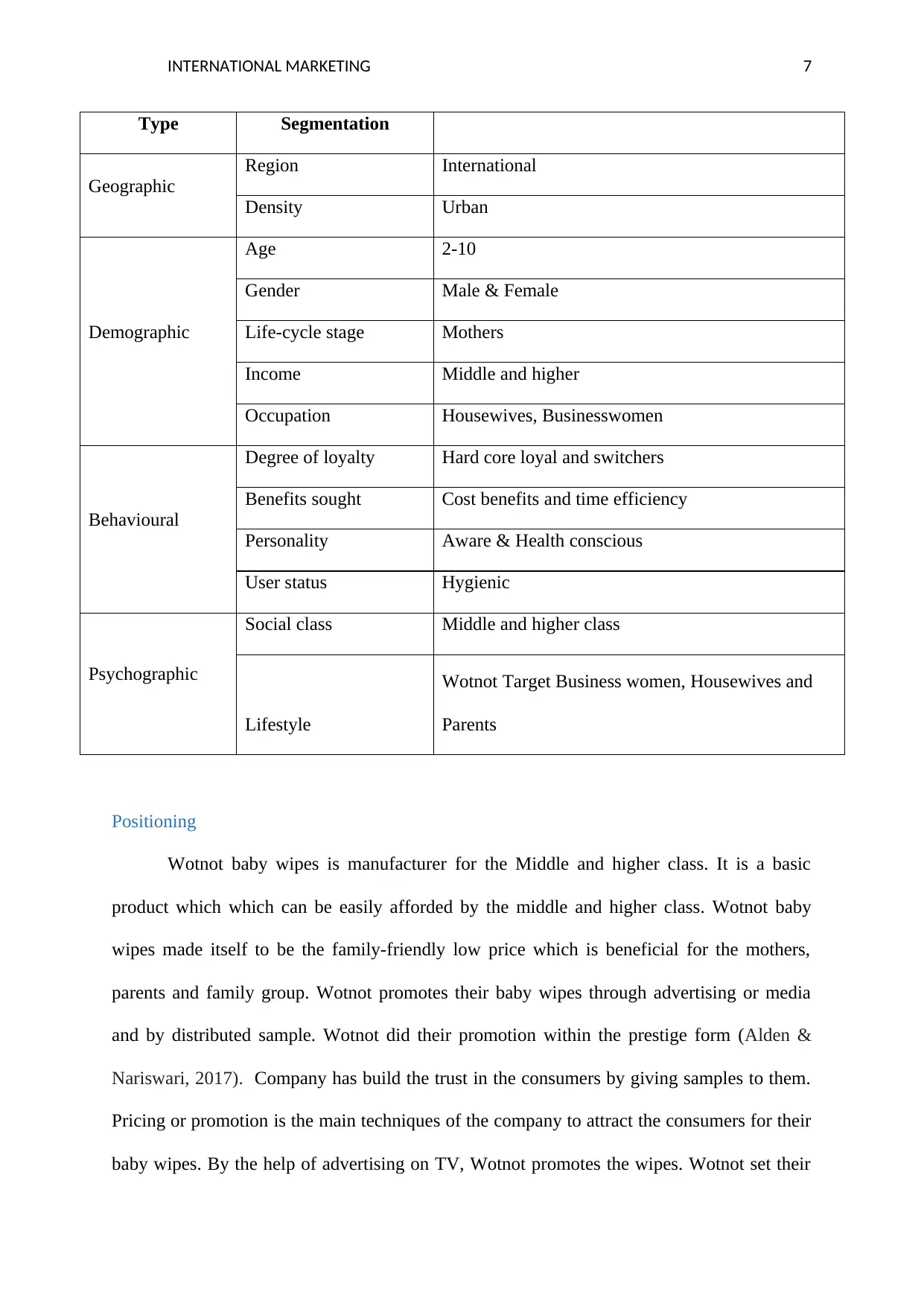
INTERNATIONAL MARKETING 7
Type Segmentation
Geographic
Region International
Density Urban
Demographic
Age 2-10
Gender Male & Female
Life-cycle stage Mothers
Income Middle and higher
Occupation Housewives, Businesswomen
Behavioural
Degree of loyalty Hard core loyal and switchers
Benefits sought Cost benefits and time efficiency
Personality Aware & Health conscious
User status Hygienic
Psychographic
Social class Middle and higher class
Lifestyle
Wotnot Target Business women, Housewives and
Parents
Positioning
Wotnot baby wipes is manufacturer for the Middle and higher class. It is a basic
product which which can be easily afforded by the middle and higher class. Wotnot baby
wipes made itself to be the family-friendly low price which is beneficial for the mothers,
parents and family group. Wotnot promotes their baby wipes through advertising or media
and by distributed sample. Wotnot did their promotion within the prestige form (Alden &
Nariswari, 2017). Company has build the trust in the consumers by giving samples to them.
Pricing or promotion is the main techniques of the company to attract the consumers for their
baby wipes. By the help of advertising on TV, Wotnot promotes the wipes. Wotnot set their
Type Segmentation
Geographic
Region International
Density Urban
Demographic
Age 2-10
Gender Male & Female
Life-cycle stage Mothers
Income Middle and higher
Occupation Housewives, Businesswomen
Behavioural
Degree of loyalty Hard core loyal and switchers
Benefits sought Cost benefits and time efficiency
Personality Aware & Health conscious
User status Hygienic
Psychographic
Social class Middle and higher class
Lifestyle
Wotnot Target Business women, Housewives and
Parents
Positioning
Wotnot baby wipes is manufacturer for the Middle and higher class. It is a basic
product which which can be easily afforded by the middle and higher class. Wotnot baby
wipes made itself to be the family-friendly low price which is beneficial for the mothers,
parents and family group. Wotnot promotes their baby wipes through advertising or media
and by distributed sample. Wotnot did their promotion within the prestige form (Alden &
Nariswari, 2017). Company has build the trust in the consumers by giving samples to them.
Pricing or promotion is the main techniques of the company to attract the consumers for their
baby wipes. By the help of advertising on TV, Wotnot promotes the wipes. Wotnot set their
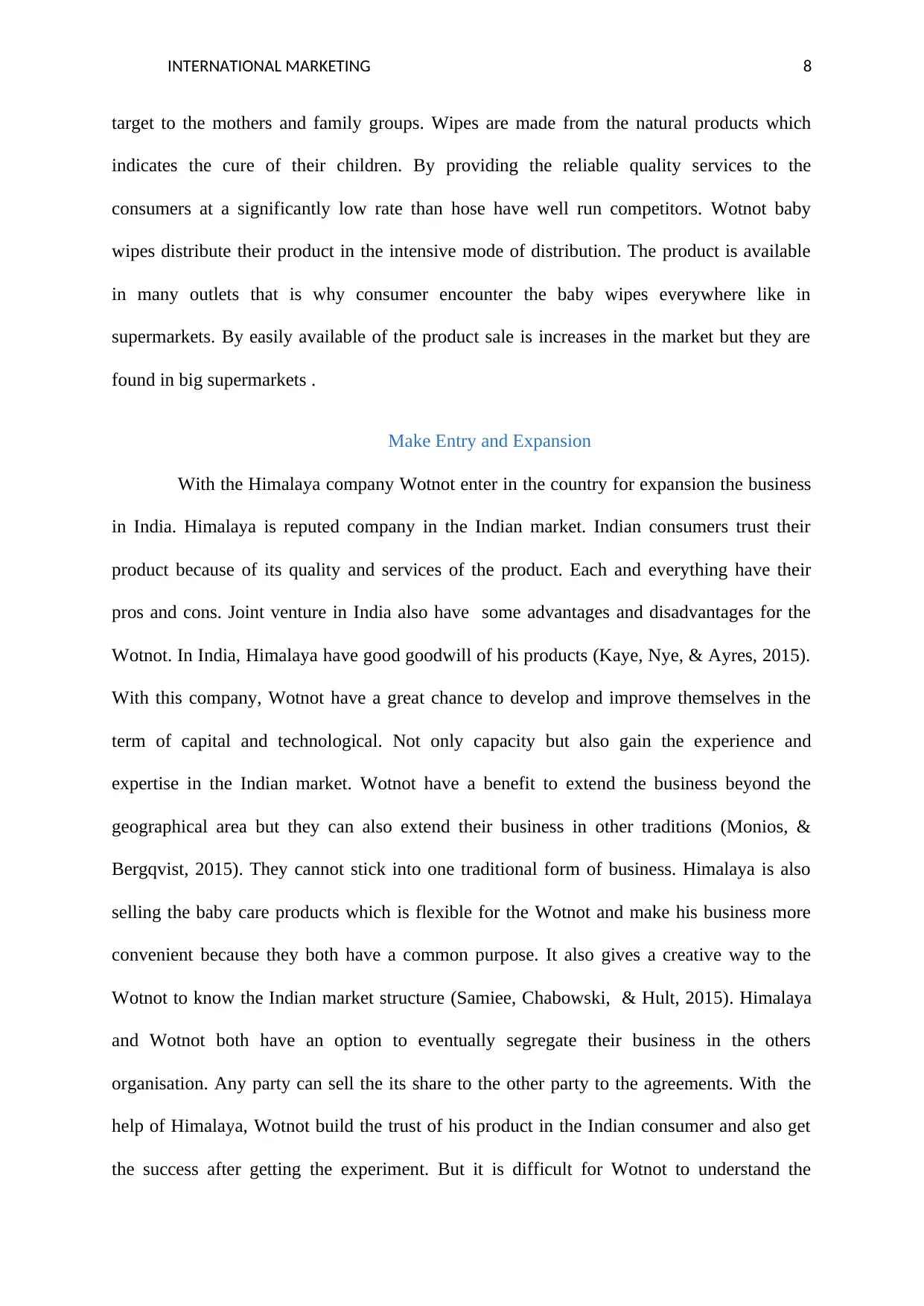
INTERNATIONAL MARKETING 8
target to the mothers and family groups. Wipes are made from the natural products which
indicates the cure of their children. By providing the reliable quality services to the
consumers at a significantly low rate than hose have well run competitors. Wotnot baby
wipes distribute their product in the intensive mode of distribution. The product is available
in many outlets that is why consumer encounter the baby wipes everywhere like in
supermarkets. By easily available of the product sale is increases in the market but they are
found in big supermarkets .
Make Entry and Expansion
With the Himalaya company Wotnot enter in the country for expansion the business
in India. Himalaya is reputed company in the Indian market. Indian consumers trust their
product because of its quality and services of the product. Each and everything have their
pros and cons. Joint venture in India also have some advantages and disadvantages for the
Wotnot. In India, Himalaya have good goodwill of his products (Kaye, Nye, & Ayres, 2015).
With this company, Wotnot have a great chance to develop and improve themselves in the
term of capital and technological. Not only capacity but also gain the experience and
expertise in the Indian market. Wotnot have a benefit to extend the business beyond the
geographical area but they can also extend their business in other traditions (Monios, &
Bergqvist, 2015). They cannot stick into one traditional form of business. Himalaya is also
selling the baby care products which is flexible for the Wotnot and make his business more
convenient because they both have a common purpose. It also gives a creative way to the
Wotnot to know the Indian market structure (Samiee, Chabowski, & Hult, 2015). Himalaya
and Wotnot both have an option to eventually segregate their business in the others
organisation. Any party can sell the its share to the other party to the agreements. With the
help of Himalaya, Wotnot build the trust of his product in the Indian consumer and also get
the success after getting the experiment. But it is difficult for Wotnot to understand the
target to the mothers and family groups. Wipes are made from the natural products which
indicates the cure of their children. By providing the reliable quality services to the
consumers at a significantly low rate than hose have well run competitors. Wotnot baby
wipes distribute their product in the intensive mode of distribution. The product is available
in many outlets that is why consumer encounter the baby wipes everywhere like in
supermarkets. By easily available of the product sale is increases in the market but they are
found in big supermarkets .
Make Entry and Expansion
With the Himalaya company Wotnot enter in the country for expansion the business
in India. Himalaya is reputed company in the Indian market. Indian consumers trust their
product because of its quality and services of the product. Each and everything have their
pros and cons. Joint venture in India also have some advantages and disadvantages for the
Wotnot. In India, Himalaya have good goodwill of his products (Kaye, Nye, & Ayres, 2015).
With this company, Wotnot have a great chance to develop and improve themselves in the
term of capital and technological. Not only capacity but also gain the experience and
expertise in the Indian market. Wotnot have a benefit to extend the business beyond the
geographical area but they can also extend their business in other traditions (Monios, &
Bergqvist, 2015). They cannot stick into one traditional form of business. Himalaya is also
selling the baby care products which is flexible for the Wotnot and make his business more
convenient because they both have a common purpose. It also gives a creative way to the
Wotnot to know the Indian market structure (Samiee, Chabowski, & Hult, 2015). Himalaya
and Wotnot both have an option to eventually segregate their business in the others
organisation. Any party can sell the its share to the other party to the agreements. With the
help of Himalaya, Wotnot build the trust of his product in the Indian consumer and also get
the success after getting the experiment. But it is difficult for Wotnot to understand the
⊘ This is a preview!⊘
Do you want full access?
Subscribe today to unlock all pages.

Trusted by 1+ million students worldwide
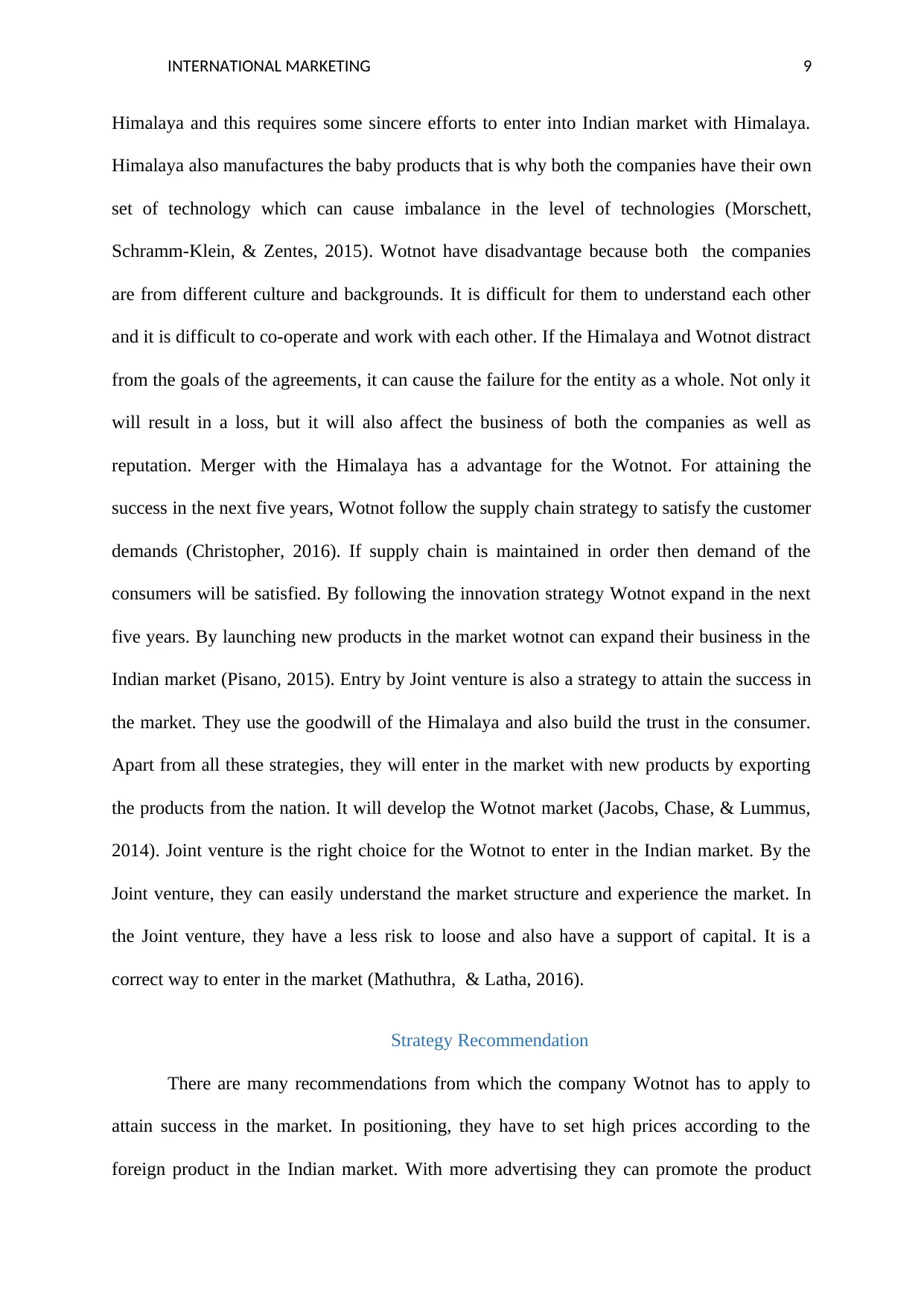
INTERNATIONAL MARKETING 9
Himalaya and this requires some sincere efforts to enter into Indian market with Himalaya.
Himalaya also manufactures the baby products that is why both the companies have their own
set of technology which can cause imbalance in the level of technologies (Morschett,
Schramm-Klein, & Zentes, 2015). Wotnot have disadvantage because both the companies
are from different culture and backgrounds. It is difficult for them to understand each other
and it is difficult to co-operate and work with each other. If the Himalaya and Wotnot distract
from the goals of the agreements, it can cause the failure for the entity as a whole. Not only it
will result in a loss, but it will also affect the business of both the companies as well as
reputation. Merger with the Himalaya has a advantage for the Wotnot. For attaining the
success in the next five years, Wotnot follow the supply chain strategy to satisfy the customer
demands (Christopher, 2016). If supply chain is maintained in order then demand of the
consumers will be satisfied. By following the innovation strategy Wotnot expand in the next
five years. By launching new products in the market wotnot can expand their business in the
Indian market (Pisano, 2015). Entry by Joint venture is also a strategy to attain the success in
the market. They use the goodwill of the Himalaya and also build the trust in the consumer.
Apart from all these strategies, they will enter in the market with new products by exporting
the products from the nation. It will develop the Wotnot market (Jacobs, Chase, & Lummus,
2014). Joint venture is the right choice for the Wotnot to enter in the Indian market. By the
Joint venture, they can easily understand the market structure and experience the market. In
the Joint venture, they have a less risk to loose and also have a support of capital. It is a
correct way to enter in the market (Mathuthra, & Latha, 2016).
Strategy Recommendation
There are many recommendations from which the company Wotnot has to apply to
attain success in the market. In positioning, they have to set high prices according to the
foreign product in the Indian market. With more advertising they can promote the product
Himalaya and this requires some sincere efforts to enter into Indian market with Himalaya.
Himalaya also manufactures the baby products that is why both the companies have their own
set of technology which can cause imbalance in the level of technologies (Morschett,
Schramm-Klein, & Zentes, 2015). Wotnot have disadvantage because both the companies
are from different culture and backgrounds. It is difficult for them to understand each other
and it is difficult to co-operate and work with each other. If the Himalaya and Wotnot distract
from the goals of the agreements, it can cause the failure for the entity as a whole. Not only it
will result in a loss, but it will also affect the business of both the companies as well as
reputation. Merger with the Himalaya has a advantage for the Wotnot. For attaining the
success in the next five years, Wotnot follow the supply chain strategy to satisfy the customer
demands (Christopher, 2016). If supply chain is maintained in order then demand of the
consumers will be satisfied. By following the innovation strategy Wotnot expand in the next
five years. By launching new products in the market wotnot can expand their business in the
Indian market (Pisano, 2015). Entry by Joint venture is also a strategy to attain the success in
the market. They use the goodwill of the Himalaya and also build the trust in the consumer.
Apart from all these strategies, they will enter in the market with new products by exporting
the products from the nation. It will develop the Wotnot market (Jacobs, Chase, & Lummus,
2014). Joint venture is the right choice for the Wotnot to enter in the Indian market. By the
Joint venture, they can easily understand the market structure and experience the market. In
the Joint venture, they have a less risk to loose and also have a support of capital. It is a
correct way to enter in the market (Mathuthra, & Latha, 2016).
Strategy Recommendation
There are many recommendations from which the company Wotnot has to apply to
attain success in the market. In positioning, they have to set high prices according to the
foreign product in the Indian market. With more advertising they can promote the product
Paraphrase This Document
Need a fresh take? Get an instant paraphrase of this document with our AI Paraphraser
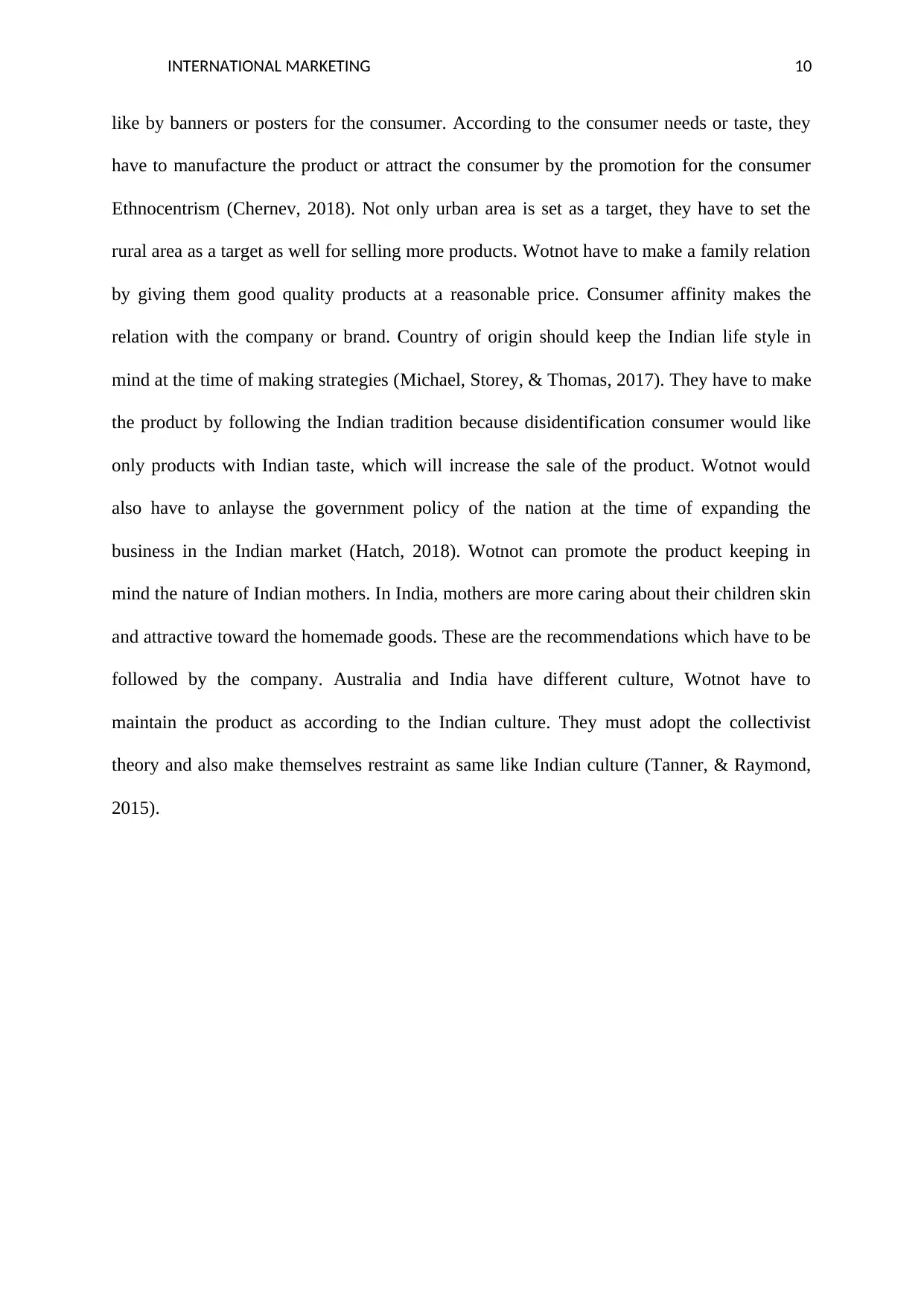
INTERNATIONAL MARKETING 10
like by banners or posters for the consumer. According to the consumer needs or taste, they
have to manufacture the product or attract the consumer by the promotion for the consumer
Ethnocentrism (Chernev, 2018). Not only urban area is set as a target, they have to set the
rural area as a target as well for selling more products. Wotnot have to make a family relation
by giving them good quality products at a reasonable price. Consumer affinity makes the
relation with the company or brand. Country of origin should keep the Indian life style in
mind at the time of making strategies (Michael, Storey, & Thomas, 2017). They have to make
the product by following the Indian tradition because disidentification consumer would like
only products with Indian taste, which will increase the sale of the product. Wotnot would
also have to anlayse the government policy of the nation at the time of expanding the
business in the Indian market (Hatch, 2018). Wotnot can promote the product keeping in
mind the nature of Indian mothers. In India, mothers are more caring about their children skin
and attractive toward the homemade goods. These are the recommendations which have to be
followed by the company. Australia and India have different culture, Wotnot have to
maintain the product as according to the Indian culture. They must adopt the collectivist
theory and also make themselves restraint as same like Indian culture (Tanner, & Raymond,
2015).
like by banners or posters for the consumer. According to the consumer needs or taste, they
have to manufacture the product or attract the consumer by the promotion for the consumer
Ethnocentrism (Chernev, 2018). Not only urban area is set as a target, they have to set the
rural area as a target as well for selling more products. Wotnot have to make a family relation
by giving them good quality products at a reasonable price. Consumer affinity makes the
relation with the company or brand. Country of origin should keep the Indian life style in
mind at the time of making strategies (Michael, Storey, & Thomas, 2017). They have to make
the product by following the Indian tradition because disidentification consumer would like
only products with Indian taste, which will increase the sale of the product. Wotnot would
also have to anlayse the government policy of the nation at the time of expanding the
business in the Indian market (Hatch, 2018). Wotnot can promote the product keeping in
mind the nature of Indian mothers. In India, mothers are more caring about their children skin
and attractive toward the homemade goods. These are the recommendations which have to be
followed by the company. Australia and India have different culture, Wotnot have to
maintain the product as according to the Indian culture. They must adopt the collectivist
theory and also make themselves restraint as same like Indian culture (Tanner, & Raymond,
2015).
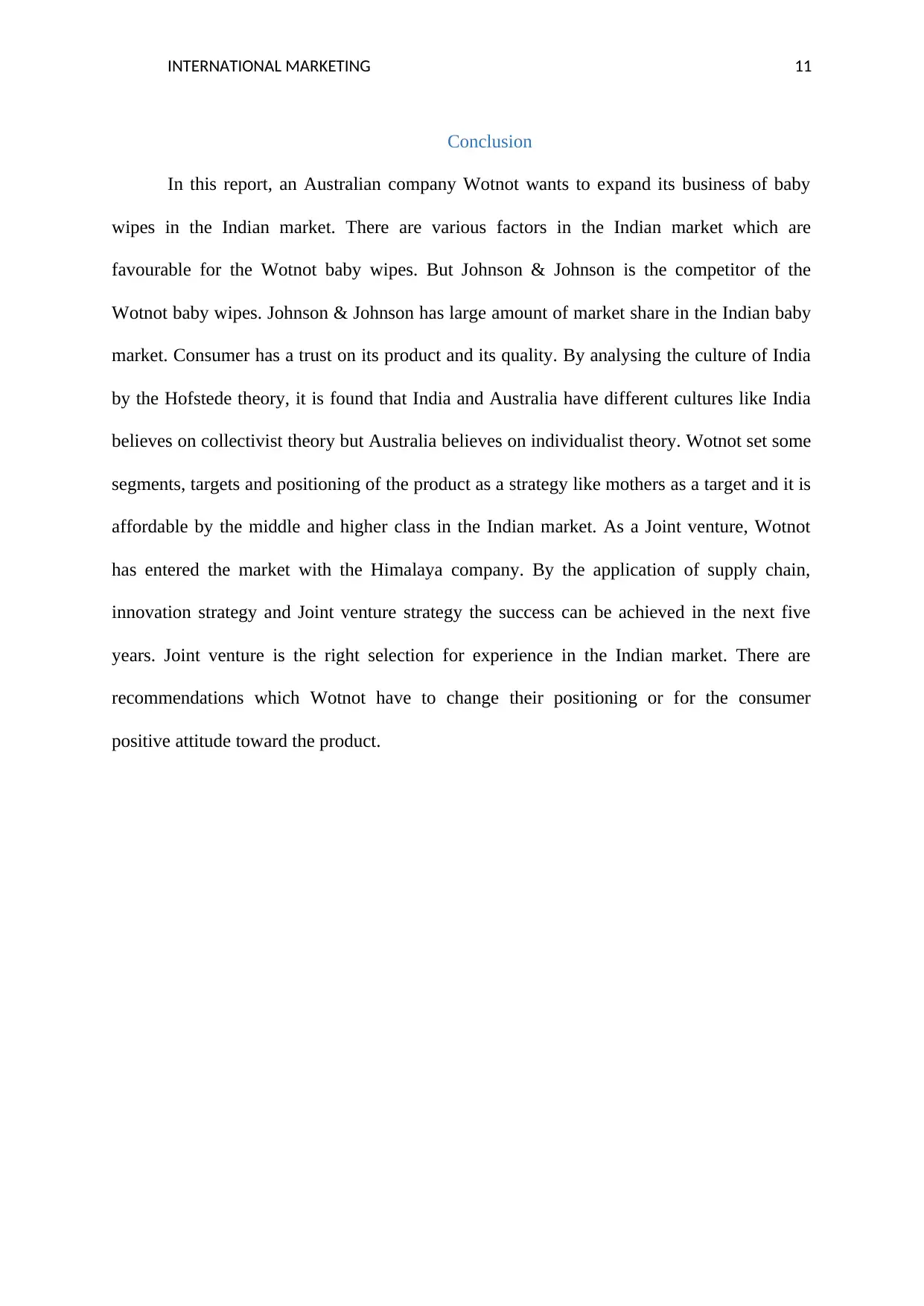
INTERNATIONAL MARKETING 11
Conclusion
In this report, an Australian company Wotnot wants to expand its business of baby
wipes in the Indian market. There are various factors in the Indian market which are
favourable for the Wotnot baby wipes. But Johnson & Johnson is the competitor of the
Wotnot baby wipes. Johnson & Johnson has large amount of market share in the Indian baby
market. Consumer has a trust on its product and its quality. By analysing the culture of India
by the Hofstede theory, it is found that India and Australia have different cultures like India
believes on collectivist theory but Australia believes on individualist theory. Wotnot set some
segments, targets and positioning of the product as a strategy like mothers as a target and it is
affordable by the middle and higher class in the Indian market. As a Joint venture, Wotnot
has entered the market with the Himalaya company. By the application of supply chain,
innovation strategy and Joint venture strategy the success can be achieved in the next five
years. Joint venture is the right selection for experience in the Indian market. There are
recommendations which Wotnot have to change their positioning or for the consumer
positive attitude toward the product.
Conclusion
In this report, an Australian company Wotnot wants to expand its business of baby
wipes in the Indian market. There are various factors in the Indian market which are
favourable for the Wotnot baby wipes. But Johnson & Johnson is the competitor of the
Wotnot baby wipes. Johnson & Johnson has large amount of market share in the Indian baby
market. Consumer has a trust on its product and its quality. By analysing the culture of India
by the Hofstede theory, it is found that India and Australia have different cultures like India
believes on collectivist theory but Australia believes on individualist theory. Wotnot set some
segments, targets and positioning of the product as a strategy like mothers as a target and it is
affordable by the middle and higher class in the Indian market. As a Joint venture, Wotnot
has entered the market with the Himalaya company. By the application of supply chain,
innovation strategy and Joint venture strategy the success can be achieved in the next five
years. Joint venture is the right selection for experience in the Indian market. There are
recommendations which Wotnot have to change their positioning or for the consumer
positive attitude toward the product.
⊘ This is a preview!⊘
Do you want full access?
Subscribe today to unlock all pages.

Trusted by 1+ million students worldwide
1 out of 15
Related Documents
Your All-in-One AI-Powered Toolkit for Academic Success.
+13062052269
info@desklib.com
Available 24*7 on WhatsApp / Email
![[object Object]](/_next/static/media/star-bottom.7253800d.svg)
Unlock your academic potential
Copyright © 2020–2025 A2Z Services. All Rights Reserved. Developed and managed by ZUCOL.





